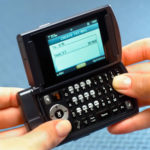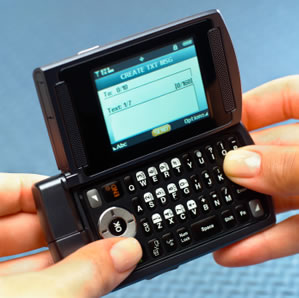
University of Maryland students who went 24 hours without TV, cell phones, MP3 players, and laptops during a recent study reported symptoms you might expect from someone struggling with substance abuse, including an “unbearable” need for electronic communication, persistent anxiety, and a frantic “craving for some technology.” The study’s findings have prompted some observers to ask: Are today’s students addicted to technology—and if so, what implications might this have for education?
The university’s International Center for Media & the Public Agenda (ICMPA) on April 21 released the findings of its study, “24 Hours: Unplugged,” which had 200 undergraduates go without access to any form of media for one day, even requiring study participants to leave their dormitory if a roommate was watching TV.
The students blogged about their technology detox afterward and compiled more than 100,000 words on the study’s web site, roughly the length of a 400-page novel. Responses varied from aggravation to frustration to isolation, which was especially keen for students without access to social media sites like Twitter and Facebook, or the ability to send dozens of text messages throughout the day.
“We wanted to make the students more thoughtful about the sea of news in which they swim,” said Susan Moeller, director of the ICMPA and a University of Maryland journalism professor. “It became absolutely common for students to make those kind of statements about how they felt [an addiction] to media. … It wasn’t just a rhetorical exaggeration.”
The study was conducted from Feb. 24 to March 4. Participants’ ages ranged from 18-21.
Some study participants, Moeller said, reported “phantom ringing,” a phenomenon in which students hear their phone ringing or feel it buzzing even if they’re in the lecture hall and their phone is in their dorm room.
One participant admitted to succumbing to the need for electronic back-and-forth with friends after 19 hours without the technological essentials of modern college life.
“I got back from class around 5, frantically craving some technology and to look through my phone, so I cheated a little bit and checked my phone,” the student wrote. “From my phone, I accessed text messages, close to a dozen missed calls, glanced at some eMails, and acknowledged many twitter @replies from followers wondering where I was and if I was OK. At that moment, I couldn’t take it anymore being in my room … alone … with nothing to occupy my mind, so I gave up shortly after 5 p.m.”
Another Maryland student, instead of looking for other ways to occupy his time without an iPod, cell phone, or laptop, decided sleep was the only escape from the agony of a tech-free existence.
“My short attention span prevented me from accomplishing much, so I stared at the wall for a little bit,” the student wrote in a post-study blog response. “After doing some push-ups, I just decided to take a few Dramamine and go to sleep to put me out of my misery.”
Suddenly unable to make on-the-go post-class plans, study participants said life without the instant communication of a cell phone forced a dramatic adjustment in how they scheduled their day.
“Not having a cell phone created a logistical problem. It was manageable for one day, but I cannot see how life would be possible without one,” the student wrote. “The most important aspect of a cell phone seems to be being able to meet up with people. … It is problematic having to make up specific times and places to meet up with people: most of us are very accustomed to our flexible, by-the-whim lives.”
Research from the Pew Research Center’s Internet & American Life Project shows that half of teenagers surveyed send 1,500 text messages a month, and one-third of survey respondents send 100 texts every day, or 3,000 per month.
“24 Hours: Unplugged” also revealed college students’ unorthodox news consumption practices. Study participants largely avoided mainstream news sites from media giants like CNN and the New York Times, instead preferring blogs and activist sites that provide updates about a specific topic or issue. One participant flunked the 24-hour assignment when the lure of newsy blog items became too much to bear.
“To be entirely honest, I am glad I failed the assignment,” the student wrote. “Because if I hadn’t opened my computer when I did, I would not have known about the violent earthquake in Chile from an informal blog post on Tumblr.”
Craving electronics was not the only side effect of going a full day without access to media, Moeller said. Ditching cell phones, for instance, made many students less willing to walk across the expansive College Park campus alone at night.
“They were feeling very constrained because they didn’t have” their cell phone, she said. “There was a bit of a shock to students as to how their borders had to be adjusted.”
Higher-education communications experts said the results of Maryland’s social media study were not surprising, citing the near-ubiquity of constant Twitter and Facebook updates, text messages, and phone calls among college-aged men and women.
“If their job or lifestyle has little human interaction and their primary connection is electronic, then I become concerned,” said LisaMarie Luccioni, a communications professor at the University of Cincinnati, who bars students from texting with few exceptions. “In the end, we were designed to be social creatures. Face-to-face interaction is needed to most authentically connect.”
Luccioni said back-and-forth text message conversations can even hinder a student’s ability to walk from class to class.
“I’m noticing students walking on campus, bumping into doorways or other people because they’re texting or reading a text,” she said, adding that even students who resist social media platforms will one day become devoted Tweeters and Facebook users. “My sense is that those resisting may eventually cave to peer pressure to purchase these products and then become, as the [Maryland study] suggests, addicted to them.”
University of Maryland students’ need for social media reflects findings that more than 90 percent of college students use social-networking services such as Facebook and Twitter, according to the 2009 “Survey of Undergraduate Students and Information Technology,” from the EDUCAUSE Center for Applied Research. That study included a web-based survey of freshmen and seniors at 103 four-year colleges and universities and 12 two-year schools, as well as focus groups with 62 students from four institutions.
Link:
- Research: Social media has negative impact on academic performance - April 2, 2020
- Number 1: Social media has negative impact on academic performance - December 31, 2014
- 6 reasons campus networks must change - September 30, 2014
